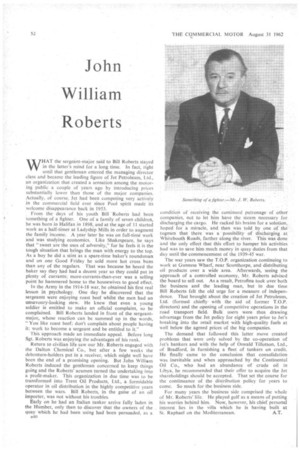John William Roberts
Page 54

If you've noticed an error in this article please click here to report it so we can fix it.
WHAT the sergeant-major said to Bill Roberts stayed in the latter's mind for a long time. In fact, right until that gentleman entered the managing director class and became the leading figure of Jet Petroleum, Ltd., an organization that created a sensation among the motoring public a couple of years ago by introducing prices substantially lower than those of the major companies. Actually, of course, Jet had been competing very actively in the commercial field ever since Pool spirit made its welcome disappearance back in 1953.
From the days of his youth Bill 'Roberts had been something of a fighter. One of a family of seven children, he was born in Halifax in 1898, and at the age of 11 started work as a half-timer at Ladyship Mills in order to augment the family income. A year later he was on full-time work and was studying economics. Like Shakespeare, he says that "sweet are the uses of adversity," for he feels it is the tough situation that brings the man with energy to the top. As a boy he did a stint as a spare-time baker's roundsman and on one Good Friday he sold more hot cross buns than any of the regulars. That was because he heard the baker say they had had a decent year so they could put in plenty of currants; more-currants-than-ever was a selling point he hammered home to the housewives to good effect.
In the Army in the 1914-18 war, he obtained his first real lesson in psychology. One day he discovered that the sergeants were enjoying roast beef whilst the men had an unsavoury-looking stew. He knew that even a young soldier is entitled to make an official complaint, so he complained. Bill Roberts landed in front of the sergeantmajor, whose reaction can be summed up in the words, "You like roast beef; don't complain about people having it; work to become a sergeant and be entitled to it."
This approach made an immediate appeal. Before long Sgt. Roberts was enjoying the advantages of his rank.
Return to civilian life saw our Mr. Roberts engaged with the Dalton Chemical Co., but after a few weeks the debenture-holders put in a receiver, which might well have been the end of a promising opening. But John William Roberts induced the gentleman concerned to keep things going and the Roberts' acumen turned the undertaking into a profit-maker. This organization in due time was to be transformed into Trent Oil Products, Ltd., a formidable operator in oil distribution in the highly competitive years between the wars. Bill Roberts, in the guise of an oil importer, was not without his troubles.
Early on he had an Italian tanker arrive fully laden in the Humber, only then to discover that the owners of the quay which he had been using had been persuaded, as a 1340 condition of receiving the continued patronage of other companies, not to let him have the steam necessary for discharging the cargo. He racked his brains for a solution, hoped for a miracle, and then was told by one of the tugmen that there was a possibility of discharging at Whitebooth Roads, farther along the river. This was done and the only effect that this effort to hamper his activities • had was to save him much money in quay, duties from that day until the commencement of the 1939-45 war.
The war years saw the T.O.P. organization continuing to work at Gunness Wharf, near Scunthorpe, and distributing oil products over a wide area. Afterwards, seeing the approach of a controlled economy, Mr. Roberts advised the board to sell out. As a result, Petrofina took over both the business and the leading man, but in due time Bill Roberts felt the old urge for a measure of independence. That brought about the creation of Jet Petroleum, Ltd. (formed chiefly with the aid of former T.O.P. directors) and the opening of competitive operations in the road transport field. Bulk users were thus drawing advantage from the Jet policy for eight years prior to Jet's breaking into the retail market with high-quality fuels at well below the agreed prices of the big companies.
The demand that followed this latter move created problems that were only solved by the co-operation of Jet's bankers and with the help of Oswald Tillotson, Ltd., of Bradford, in furnishing a fleet of tankers on credit. He finally came to the conclusion that consolidation was inevitable and when approached by the Continental Oil Co., who had an abundance of crude oil in Libya, he recommended that their offer to acquire the Jet shareholdings should be accepted. That set the course for the continuance of the distribution policy for years to come. So much for the business side.
For many years the business side comprised the whole of Mr. Roberts' life. He played golf as a means of putting his worries behind him. Now, however, his chief personal interest lies in the villa which he is having built at St. Raphael on the Mediterranean. A.T.




























































































